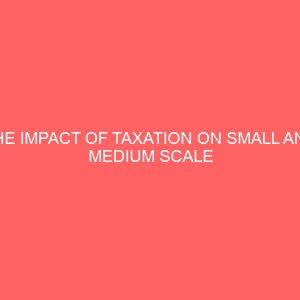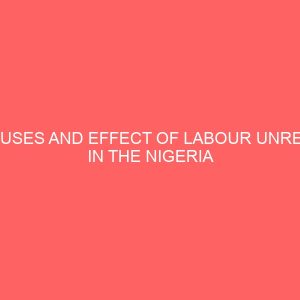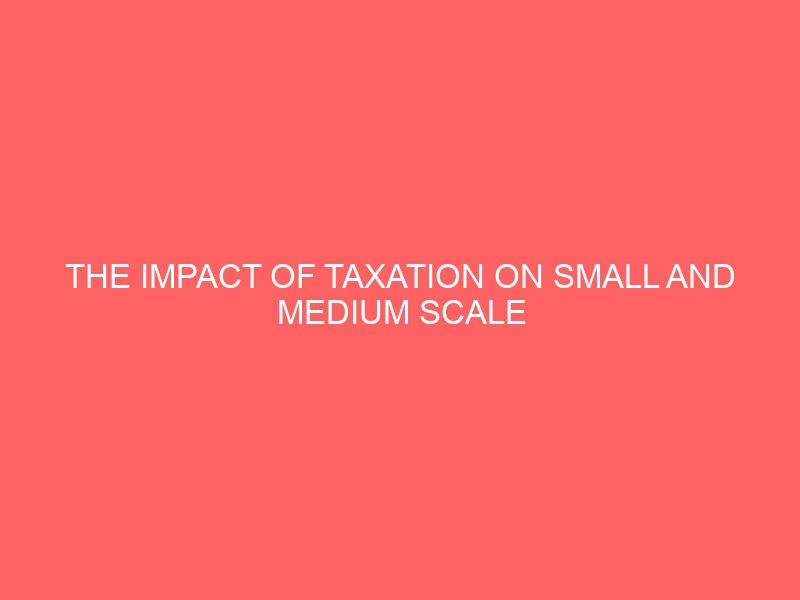Description
CHAPTER ONE
1.0 INTRODUCTION
1.1 BACKGROUND OF THE STUDY
It has been a great concern to all and sundry to promote the welfare of SMEs and that the vital subsector has fallen short of expectation. The situation is more disturbing and worrying when compared with what other developing and developed countries have been able to achieve with their SMEs. It has been shown that there is a high correlation between the degree of poverty hunger, unemployment, economic well being (standard of living) of the citizens of countries and the degree of vibrancy of the respective country?s SMEs. The time is now to do something surgical to the situation of our SMEs given the aggravating level of poverty in Nigeria and the need to meet up with the Millennium Declaration Goals. The decreasing level of Nigeria?s per capita income, which declined from $870 in 1981 to $260 in 1998, and $205 in 2004 as well as a low level of agricultural, industrial and infrastructural development (irrigation, road and railway networks) all represent disturbing indices, which also contribute to the dismal performance and contribution of our SMEs.
However, the mortality rate of these small firms is very high. According to the Small and Medium Scale Enterprises Development Agency of Nigeria (SMEDAN), 80% of SMEs die before their 5th anniversary. Among the factors responsible for these untimely close-ups are tax related issues, ranging from multiple taxations to enormous tax burdens among other issues etc. In many government policies, small and medium scale enterprises are usually viewed and treated in the same light as large corporations.
However, their size and nature make them unique. Therefore, in dealing with small and medium scale enterprises, these unique qualities need to be considered. In levying of taxes for these enterprises in particular, issues that need to be considered are how these tax policies can be designed to bolster the growth of SMEs and the most effective ways to administer them. The importance of SMEs as a mechanism of economic growth and development is often ignored.
Taxes have existed virtually as long as there have been organized governments. The first tax law legislation was introduced in 1919 and ever since then taxes have evolved through a number of reforms. The government in an attempt to widen the tax base and collect more revenue has had to levy several taxes especially on business enterprises in Nigeria which constitute a large part of the formal sector. The taxes charged on business enterprises in Nigeria include; corporation tax, value added tax, presumption tax and exercise duty. In 1997 the Income Tax Act was made. This was to give guidance in assessment and computation of taxes (Campsy, 1997). The Nigerian government has made some recommendable efforts to promote development through taxation since the inception of the current taxation laws for purposes of promoting development. The main objective of taxation in Nigeria has always been to mobilise resources needed to meet the aspiration of government. This is because for any government to be effective, strong, competent and capable of spearheading development, resources have to be readily available in its treasury so as to be in position to provide goods and services to the people adequately. The Nigerian government has always had to ensure proper resource mobilization (Musa, 1992).
According to Manasseh (2000), a tax is generally referred to as a compulsory levy imposed by government upon various categories of assets and taxation is a compulsory and non refundable contribution imposed by government for public purposes. In Nigeria a considerable fraction of the businesses are sole traders operating small scale business, locally owned and managed by individuals or families and often with very few employees working at a single location (Nigeria development bank report, 1988). Taxation in Nigeria is based on system that existed in Britain as it was a British colony.
This also applied to other colonies elsewhere and for East Africa, one tax system operated under British administration. This process began in 1900 with the hut tax regulation which imposed a standard charge for every hut/dwelling.
During that period, taxation was aimed at raising revenue for the administrative structure imposed by the colonial government but also as a means of encouraging monetary/economic activities. It was the Local Authority Ordinance of 1991 that governed the collection of taxes. In September 1991, after a period of review the Rural Revenue Authority (URA) was established. All taxes including income tax came under the umbrella of the URA. From 1992, URA has been organizing and strengthening the administrative procedures and in 1993 this process assisted by a grant from the British government of approximately US$ 10million.
At least 50 small scale business enterprises were selected in Ilorin, almost all of them employ 2-4 people. These small scale businesses are locally owned and managed by private individuals who sometimes employ their family members. These small and medium scale businesses bear a wide tax burden which has led to poor performance. Therefore, it was against this background that the researcher undertook the study to investigate more about the problem using Nigeria as a case study to evaluate the impact of taxes on small and medium scale business enterprises.
1.2 STATEMENT OF THE PROBLEM
Taxes are raised by the government to generate revenue used to provide services to the public such as; Health centers, telecommunication, roads, schools and electricity and this have helped to improve the performance of small and medium scale business enterprises. Despite the services provided, small and medium scale business enterprises performance in Nigeria is still poor. This could be due to the increasing tax burden brought about by tax rates which are revised annually. These rates seem to be taking an upward trend (Gordon and Dawson, 1987) which has led to winding up of some small scale business enterprises. This prompted the researcher to investigate more about the impact of taxes on small scale business enterprises.
1.3 PURPOSE OF THE STUDY/OBJECTIVE OF THE STUDY
The purpose of the study was to evaluate the impact of taxes on small scale business enterprises in Nigeria. The specific objectives are:
i. To assess the impact of taxation on small and medium scale business enterprises in Nigeria.
ii. To find out if tax payers are aware of all their tax obligations and policies.
iii. To find out problems affecting tax payers and their business.
1.4.1 RESEARCH QUESTIONS
i. What is the effect of taxes on the performance of small scale business in Eruwa Oyo State Nigeria?
ii. Are tax payers aware of all their obligations?
iii. What are the problems faced by tax payers?
1.5 Scope of the study
1.5.1 Subject scope
The study covered small and medium scale businesses in Nigeria. Specifically, the study investigated the performance of small scale businesses, the awareness of the tax payers regarding their obligations, problems faced by the tax payers and the relationship between the taxes paid and the performance of the small scale businesses.
1.5.2 Geographical Scope
The study was carried out in Eruwa Oyo State, Nigeria. The area was purposely selected because the researcher worked within the vicinity and therefore this eased data collection.
1.5.3 Time Scope
The study considered a period of four to six months. This period was selected to enable the researcher come up with coherent information from the respondents as it would enable those (Respondents) to give responses that are typical of their opinion from the observations made over this period.
1.6 SIGNIFICANCE OF THE STUDY
The findings of the study are significant on the following ways;
i. To scholars and researchers, the findings of the study are expected to contribute to the existing literature about taxation and the effect it causes to the economy as a whole.
ii. To the tax authority and government, the study will guide them in adjusting tax policies so that they suit requirements of small and medium scale businesses.
iii. To future academicians especially of Nigeria University students, the study will help in gaining insight about taxes and performance of small scale business enterprises.
iv. The accomplishment of the study will enable the researcher to acquire hands on skills about processing of research work and data analysis. This proficiency will enable the researcher to handle such related work with a lot of precision and proficiency.
1.7 DEFINITION OF TERMS
Tax: This is a compulsory financial charge or other levy upon and individual or legal entity by a state or the functional equivalent of the state such that failure to pay is punishable by law. It is not a voluntary contribution, payment or donation but rather, it is imposed by government under t6hthe name of import duty, exercise, etc.
Tax rate: Taxes are most often levied as a percentage. Thus, tax rate is the percentage of income or profit of individual paid as tax.
Tax burden or tax base: otherwise called tax incidence is on whom a tax is collected. Depending on the elasticity of product, a tax imposed on a seller can be ultimately paid by the buyer simply by shifting the burden in form of a higher price.
Small scale enterprise: This is sometime called small scale business. It is a business that employs small number of workers and does not have a very high volume of sales.







